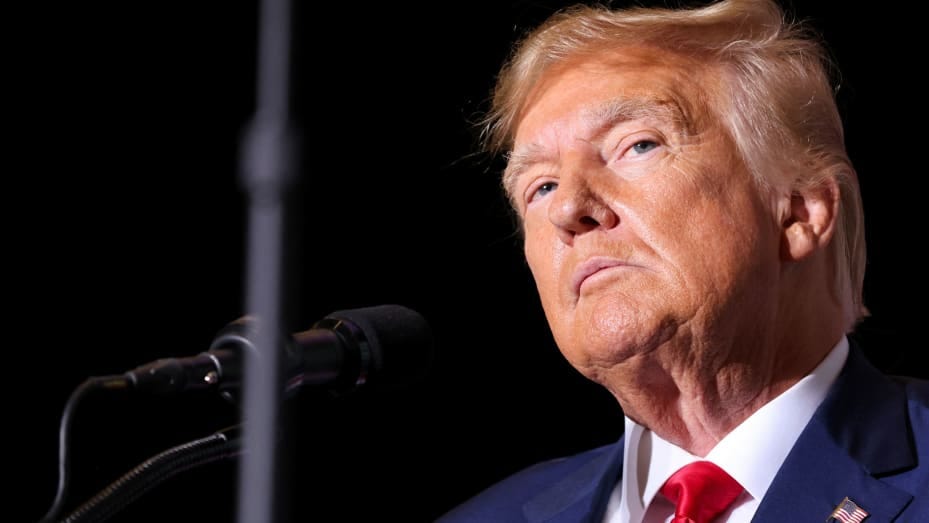There’s an eye-opening story in the New York Times this morning outlining what a 2nd term for former President Donald Trump might look like.
Here’s the key bit:
Donald J. Trump and his allies are planning a sweeping expansion of presidential power over the machinery of government if voters return him to the White House in 2025, reshaping the structure of the executive branch to concentrate far greater authority directly in his hands…
…Mr. Trump and his associates have a broader goal: to alter the balance of power by increasing the president’s authority over every part of the federal government that now operates, by either law or tradition, with any measure of independence from political interference by the White House, according to a review of his campaign policy proposals and interviews with people close to him.
This should surprise absolutely no one.
Remember that toward the end of his term, Trump was already in the process of consolidating power — most notably by appointing a number of acting secretaries and heads of agencies rather than nominating permanent replacements.
“I like acting,” he said in January 2019. “It gives me more flexibility. Do you understand that? I like acting. So we have a few that are acting. We have a great, great Cabinet.”
Why did Trump like acting Cabinet secretaries? Because they didn’t have to be confirmed by the Senate, they owed all of their loyalty to Trump and Trump alone.
Remember too that Trump tried to replace the attorney general in the dying days of his administration as part of a broader effort to use the power of the federal government to overturn the election.
And we now know, thanks to former chief of staff John Kelly, that Trump wanted to use the IRS’ investigative powers to look into the financial backgrounds of his political enemies — including former FBI Director James Comey.
What’s clear from a study of Trump’s time on office is that the longer he was in the presidency, the bolder he got about consolidating power in the executive branch and, in particular, in the Oval Office.
His first 18 months (or so) were defined by attempts to play nice — or at least make the occasional bow to the traditional political system.
Trump installed a former chairman of the Republican National Committee as his chief of staff and put together a Cabinet that, generally speaking, drew rave reviews from the establishment wing of the Republican party.
None other than Mitt Romney praised Trump shortly after the election — noting that Trump’s Cabinet choices “give me increasing hope that President-elect Trump is the very man who can lead us to that better future.”
From his early days in the White House, Trump chafed at the limits placed on his ability to run the government exactly as he chose. He bristled at criticism when he referred to “my generals” and “my military.” He seemed to have no sense of the long-held, arms-length relationship between the White House and the Department of Justice.
It quickly became clear that Trump viewed the entire federal government the same way he viewed his eponymous company: Everyone and everything should work in service of him — his wants, needs and, most importantly, his vendettas.
And the longer Trump was in office, the more he bent the government to that image. 1 The more he not only was willing to push boundaries but knew how to do it effectively.
That fact —even before this latest Times article — is why I am convinced that if you thought Trump’s first term was filled with barrier-breaking (not the good kind) then you ain’t seen nothing yet.
Trump won’t have the learning curve he experienced in his first term when it comes to radically overhauling how the federal bureaucracy works — and doesn’t. And he won’t even attempt to make nice with the traditional elements of his party, most of whom he has already categorized as RINOs and traitors to the conservative cause.
Trump, as the Times story makes clear, will instead hit the ground running in his attempt to dismantle the so-called “Deep State.”
Which means that his first term — and its aberrations — will look like molehills compared to the mountains of change he is planning to bring to the government this time around.
A second term will feature Trump unbound by (any) tradition and far savvier about how to force his will upon the structures of government.
In short: Look out.
Remember the debate over whether the presidency would change Trump. Funny joke.




It will be the end of American democracy and no, I don't believe that I'm exaggerating or being hyperbolic.
In short, as many have already noted, we have a choice between re-electing Biden or installing a dictator. The Times story is important and shouldn't be forgotten moving forward.